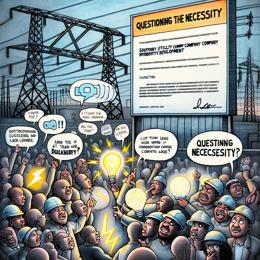Image created by AI
Johannesburg Mulls Reversal of R200 Prepaid Electricity Charge after Public Pushback
The City of Johannesburg is reconsidering the controversial R200 fixed charge on prepaid electricity amid a significant public uproar and criticism from civic organizations. Following a statement by Finance MMC, Dada Morero, residents have been given a glimmer of hope that the Council is actively engaging in a review process, despite earlier affirmations from Mayor Kabelo Gwamanda that the surcharge was a definitive measure.
This turnaround comes against the backdrop of heightened alarm among citizens who expressed their dissatisfaction on various platforms, including social media forums, illustrating their shock at the transactional value of their electricity purchases post-implementation of the surcharge. A visible example was a MyBroadband Forum user posting that a R500 recharge netted them a mere 99.30 units, spotlighting the disproportionate allocation of funds to the charge versus actual electricity credits.
The controversy has also captured the attention of the Organisation Undoing Tax Abuse (Outa), with executive manager Julius Kleynhans calling for the abandonment of the charge, especially emphasizing its detrimental impact on low-income families.
Energy analyst Chris Yelland also chimed in, highlighting the lack of transparent public engagement on the fixed charge and questioning the authenticity of Mayor Gwamanda's claims of an extensive consultative process.
Given the gravity of the situation, the Johannesburg municipality's response, signifying a review "within the approvals" received from the National Energy Regulator of South Africa (Nersa), has been perceived not only as a necessary step towards economic empathy but also as a move that could potentially forestall further social unrest linked to the escalating prepaid electricity tariffs.
Officials have indicated that they will reevaluate affordability considerations and seek a balance that may alleviate the financial strain on ratepayers. Meanwhile, the city's Expanded Social Package provides a ray of hope for the most vulnerable, offering exemption from the subscription fee and thus demonstrating a dual approach to a deeply contentious municipal financial policy.








